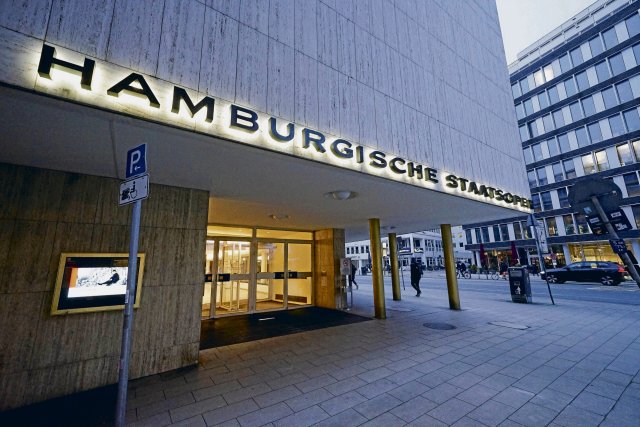Place for something new? The state opera in Hamburg’s Neustadt may be moving.
Photo: Imago/Breuel-picture
There is a need for action. Hamburg’s state opera must be renovated. Or – the city is building a new music theater. Klaus-Michael Kühne has promised a funding of 330 million euros for a new building.
Who is the man? Not the first time Kühne, born in 1937, appeared as a donor. The multi -billionaire, who keeps his place of residence in Switzerland out of allegedly tax law considerations, is the heir from the family company Kühne and Nagel. The Jewish shareholder Adolf Maass was pushed out of the company in National Socialism. At the so-called M campaign, Kuehne and Nagel benefited significantly from the disenfranchisement of Jews. Klaus-Michael Kühne has been criticized for the inadequate review of the company’s history for years.
The entrepreneur wants to have a say in the future opera building. As for the choice of architectural design and as far as the place is concerned. The latter fell on the Baakenhöft in HafenCity. A controversial decision.
Despite the participation with a three -digit million amount, there would also be costs for the Hanseatic city. As has recently been announced, the expected share amounts to around 250 million euros.
But should you let it get that far? Finance cultural buildings with dirty money? Let a private person participate in such far -reaching decisions? And does it have to be so superlative at all? Not a real cultural life in the wrong system.
On the other hand, is there money that is not dirty? Can you afford so much morality in times of scarce coffers? Is a donated opera building really suitable as a relief of historical guilt in the family?
Marco Hosemann, Urban Development Policy Spokesman for the Left Group in the Hamburg Citizenship, is the opponent of an opera new building. With a Petition he is directed against the controversial project. In a position paper from his party, he clarifies: “We don’t need a landmark, but a democratic, historical and sustainable urban development!”
Marco Hosemann, when were you last in the Hamburg State Opera?
I have never been in there. From the outside I know the building very well, and I am also a big fan of the building in an architectural terms. But I was never introduced to opera and then never found the way there myself.
They are part of an initiative that pronounces a new opera building for which the entrepreneur Klaus-Michael Kühne has promised funding. Before we come to Mr. Kühne, please say: What speaks against the new building, what – for a renovation?
I think nothing speaks for a new building. We already have a state opera in Hamburg, which is also a listed building. From investigations that the city itself commissioned, I know that the opera can be inherent and can also be adapted to changed requirements. I don’t know a single reason except me and the desire to want to play everywhere in the Champions League who speaks for a new building. Comparing how she draws cultural senator Carsten Brosda with the opera in Oslo, you can tell that it is only about another landmark with international attention. Instead, you should be satisfied with what you have, I think. In addition, there are also ecological considerations: in times of climate change, you should consider what needs to be built and what not.
At least one disadvantage of a renovation is evident: if renovation is being renovated, the game is temporarily interrupted or only possible to a limited extent. Replacement venues would have to be found.
That is definitely an argument. But I would also object that at some point, as with other houses, the time of a general renovation has come. Something positive can also grow from this: We owe Kampnagel to the renovation of the German Schauspielhaus as a new free venue.
Even if this does not have to be the goal, I do not think that the necessary search for an interim venue is already speaking for a new building, only so that the game is not interrupted. If you don’t do it quite stupid and include the summer breaks, it will be done. But also a temporary closure and switching to another place do not mean the death of the Hamburg State Opera.
Regarding the economic considerations that speak for a renovation: opponents of a new building often call any renovation costs of 150 million euros. The number comes from an expert opinion from 2020, i.e. a time before the energy crisis and inflation. Is there a sum that is a little more realistic from today’s perspective?
Interview

Marco HosemannBorn in 1985 in Nordhorn, the Urban Development Policy spokesman for the Left Group in the Hamburg Citizenship, which he has belonged to since March 2025. The trained carpenter and studied architect have also been a member of the Hamburg-Nord district assembly since last year.
I don’t measure myself to be able to name a serious number. But of course the construction costs have increased since then. The Senate pursues a kind of salami tactic in its new buildings and only announces the possible costs. In the meantime it is said that Hamburg would participate in the new building with 250 million euros. If you look at the increased construction costs, you would probably still be below it.
If a funding of 330 million euros is promised, as Mr. Kühne now does, it has a very tempting effect to simply accept the money. Doesn’t much speaks for it?
Most of them have understood: this is not about a gift, but about funding. Even if the contribution that Mr. Kühne would add is not small, we do not know how high the actual costs for the city are. We already know that from the Elbphilharmonie. Once construction started, the city may pay on it so that it will be continued.
I know that many people rate it differently, but I would not accept money from this man. This assets are wrongly based on crimes in which bold and nail was involved and the Klaus-Michael Kühne never had it independent and publicly processed.
Many of the large cultural houses in Germany have been built by princes or donated by rich citizens, private entrepreneurs. However, it is not the case today that the city society would connect these institutions with these pencils. Does the argument fail that it is about a monument to Mr. Kühne, not this fact?
I do not believe that. Even if this institution would be called the Hamburg State Opera and not Kühne opera-unlike at the Laiszhalle-I am sure that such a landmark would be remembered by Klaus-Michael Kühne on every city tour and every barge ride.
One should not misjudge the fact that this is not simply about a good deed, but that Mr. Kühne has also been criticized in recent years and that he would now like to be remembered differently with the help of his money.
If it was the intention of Mr. Kühne to distract from the company’s history of Kuehne and Nagel during the time of National Socialism, this plan has at least not emerged. The debate about the new opera building is talked about this injustice for a long time.
Yes, he will not have expected this loud criticism.
Not only the new building in general, but also the place made by Mr. Kühne as a condition, the Baakenhöft, is criticized. Why?
The Baakenhöft used to be a trading hub for colonial goods, but also the place from which troops and weapons were transported to the oppression of the Herero and Nama. That was the first genocide in the 20th century. It has long been demanded that something is created here that reminds of this crime. A place of remembrance belongs to this last available property for public use at the Baakenhafen, no opera that overwrites this story.
Nd.Diewoche – Our weekly newsletter

With our weekly newsletter . We’re Doing Look at the most important topics of the week and read them Highlights our Saturday edition on Friday. Get the free subscription here.
But there is a risk that in the end you will not get both: no opera and no memorial in a historical place.
In my opinion, even the Senate should not only decide on such a memorial and its exact design, but only together with the city society. There should also be talk about what can be created in such a place. Rooms for youth culture, for example. There are certainly uses that can be better reconciled with a memorial location than an opera, for example.
From a Berlin perspective, this Hamburg dispute also has something strange: while the cultural budget is reduced in Berlin, it has even increased in Hamburg. In Berlin there was a renovation stop at the comic opera in the room, which would have been the first step towards processing. The patron and private founders are, unlike in Hamburg, only a pious wish of politics, but not the reality.
It is like this: We could probably build five bold operas in Hamburg if Klaus-Michael Kühne did not pay his taxes in Switzerland, but here. Of course, this is difficult to change real politically. After all, I find it positive about the entire debate that this behavior of patrons and donors becomes a topic in this way.
judi bola online demo slot link sbobet judi bola
